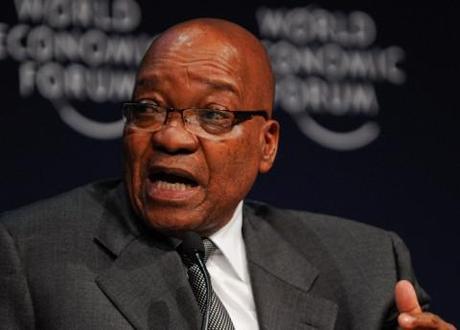 South African president Jacob Zuma is under fire for his handling of the Lonmin mine massacre.
South African president Jacob Zuma is under fire for his handling of the Lonmin mine massacre.
Anglican Archbishop Thabo Makgoba cautioned people from using the Marikana mine shooting to score political points during a memorial service in Rustenburg, South Africa to remember the 44 people who died in the violence – but that’s precisely what seems to be happening.
Thirty-four people were killed and 78 injured after police opened fire on a crowd of 3,000 striking mine workers, some armed with sticks, machetes, and other weapons, demanding higher pay at the British-owned Lonmin platinum mine in Marikana on August 16. The violence followed the deaths of 10 people, including two police officers, in violent protests the preceding week.
The mine has been closed, but reports of worker action at two other mines are fueling industry-wide concern that the unrest is spreading and already, the price of platinum is the highest its been since May, the BBC reported. Mining constitutes roughly two-thirds of South Africa’s exports – and many are worried that the violence, combined with recent credit ratings agencies’ downgrading South Africa’s outlook to negative, could make it very difficult for the country to attract and keep foreign investment.
Meanwhile, South Africans are anguished, grieving and, perhaps most of all, angry.
In South Africa, 43 people are murdered each day, more than six times the murder rate in the US.
Zuma under fire, rejects criticism
South African President Jacob Zuma brushed off criticism that he’d handled the most lethal police action since the end of apartheid poorly and harmed investor confidence in the country’s mining industry, Bloomberg reported. He has promised to launch an investigation into the incident, but will not fire the police chief. “We are talking about an incident that took two to three minutes and government moved immediately and we are in control of the situation. If I was an international, global observer, why should I get worried? You could get worried if there is continuous fighting and killing,” he told the news agency.
Malema moves in
But while Zuma tries to handle external criticism, he’s also got domestic problems to worry about: Expelled African National Congress Youth League leader Julius Malema used the memorial service as a platform to air grievances and rouse up anger against the Zuma government. “Under democracy our people will be protected. But government has turned against its people,” he reportedly said, to rousing cheers. “Government has failed to get involved, because they are involved in the mine. This is a mining revolution and we will not surrender.”
South Africa broken, we are all to blame
South Africa is now suffering a crisis of identity and confidence, and its civil society has broken down, claimed Shelagh Gastrow, Executive Director of Inyathelo: The South African Institute for Advancement, at IOL.co.za. “It appears as if there are no longer any rules governing our behavior in South Africa – it’s everyone for themselves, from rich to poor. The police are too weak to apply the rule of law, the courts are undermined, and individuals are ignoring any social boundaries. This is indicative of a total loss of social capital and social cohesion. Missing, too, in the appalling mess on the hill at Marikana last week was any visible sign of civil society, that part of our society that focuses on ‘fixing’ what is broken.”
Lonmin in trouble even before this
The mine owners, Lonmin, threatened to fire workers four days after the incident, attracting the ire of just about everyone; they backed off that decision, but the company’s shares have plummeted. But Lonmin was in trouble before the tragedy – it could end up breaching its debt agreements as early as next month. And now, “Lonmin needs to go big, or go away,” wrote Keith Allison at Reuters. “Given the likely alternative – an ugly descent into oblivion – ambitious re-investment may be one of Lonmin’s few options.”
More in world
- Christian Pakistani girl jailed for blasphemy, could face death
- Islamist sect found living underground
- Pussy Riot sentenced to two years

